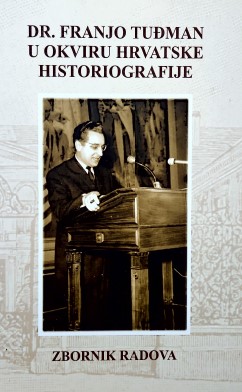RAZVOJ VOJSKE ANTIFAŠISTIČKE HRVATSKE U DJELIMA DR. FRANJE TUĐMANA
THE FORMATION OF CROATIA’S ANTIFASCIST ARMY IN FRANJO TUĐMAN’S WORKS
Author(s): Branko Dubravica
Subject(s): Military history, Security and defense, Military policy, WW II and following years (1940 - 1949), Peace and Conflict Studies
Published by: Hrvatski institut za povijest
Keywords: Partisans; Partisan squad; brigade; division; corps; liberation movement; World war II; battle; revolution;
Summary/Abstract: Franjo Tuđman is among few historians who approached the study of the antifascist movement in Croatia and Yugoslavia in the period 1941-1945 from the narrow Croatian national standpoint, overemphasizing the strength of the Croatian Partisan movement, and exhibiting great expectations he held about Yugoslav federalism. Tuđman was a participant of this movement, and the verdict he gave on the National Liberation War in whole and on its top-ranking authorities in his numerous works was positive. A decade after they took place, the constitution and the meetings of the new bodies of federal government, the Antifascist Council of the People’s Liberation of Yugoslavia (AVNOJ) and the National Antifascist Council of the People’s Liberation of Croatia (ZAVNOH), along with the important decisions they made, entitled Tuđman to the conclusion that the foundations of the monarchist centralism and unitarianism of interwar Yugoslavia had been destroyed with the constitution of the federal bodies and federal units, and that the prerequisites for the establishment of equality among the peoples of the Yugoslav federation had been established. Tuđman was a bitter opponent of the prewar monarchist and centralist system in the Great-Serbian Yugoslavia, and he felt that the bodies of the new communist and Partisan authorities, set up during the war, were a positive step in putting in effect the concept of the Yugoslav federation. He considered the proclamation of the Federal State of Croatia in Topusko a major breakthrough in the struggles for Croatian sovereignty and equality in the federation of Yugoslav countries and nations. At the same time he was opposed to the mythical glorification of the initial uprising in Serbia and Montenegro in 1941, which had soon collapsed, and countered it with his thesis about the continuous development of the Partisan movement in Croatia that had not become so widespread, but had not collapsed so quickly either. On the contrary, the Croatian movement assumed the leading role in building the Partisan movement’s armed forces in Yugoslavia as early as since the end of the summer of 1942. Peacetime reality, however, taught Tuđman that wartime practice, flattering promises, and postwar constitutional provisions were not enough to give Croatia the expected equality. Living and working in Belgrade, Tuđman soon faced the Great-Serbian mentality in the top echelons of the army, in particular when it came to the studies of the history of the People’s Liberation War, in which Serbian role was glorified and Croatian role underestimated and marginalized.
- Page Range: 249-262
- Page Count: 14
- Publication Year: 2011
- Language: Croatian
- Content File-PDF

